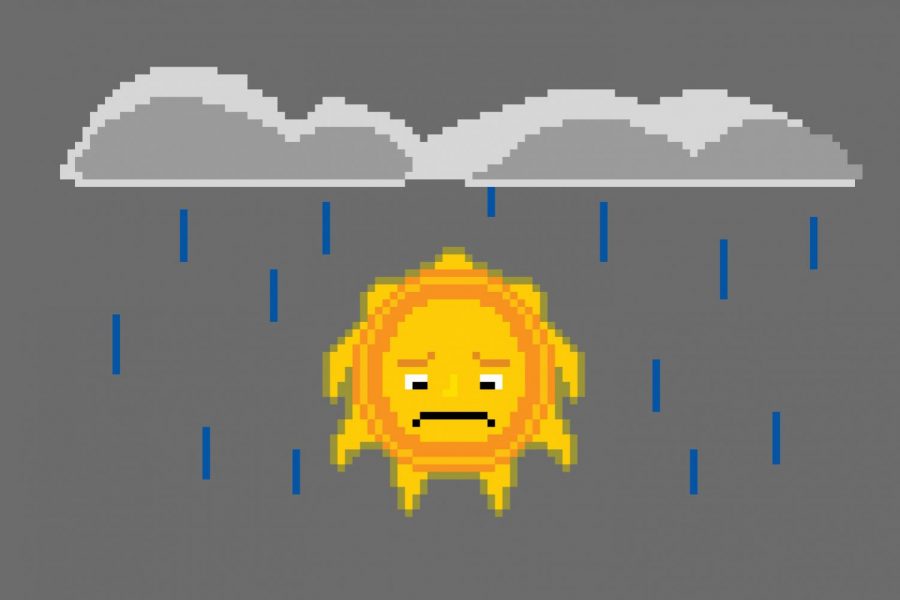Battling Seasonal Affective Disorder as a College Student
Fall is fleeting and so is the sunlight in Seattle. The long, dreaded winter is fast-approaching and with the seasonal change, sometimes emotions shift as well. Seasonal depression, or seasonal affective disorder (SAD), is a mood disorder that occurs during certain seasons throughout the year. It can be easy to feel these symptoms and overlook them as just being bummed out when in reality, SAD could be the answer.
Zac Galvan, program coordinator for Mental Health for Wellness and Health Promotion Office (WHP), spoke to how SAD is prevalent at Seattle University. Galvan himself is from California and has felt the effects of SAD when without sun, and encourages students to take advantage of the office’s resources.
“In the Pacific Northwest we find ourselves very aware of having a lot less sunlight and other inclement weather that may put people in positions where they are experiencing symptoms of depression or other mental health challenges at those times,” Galvan said.
SAD is theorized to stem from a lack of vitamin D, which is provided by the sun. In the Student Wellness Center, there is light box therapy for students, which attempts to encompass the same effect as being in the sun—it is completely free and all students need to do is reserve a slot online through the WHP website. Galvan himself is from California and has felt the effects of being without sun and encourages students to take advantage of this resource.
Chloe Deleissegues, a sophomore sports and exercise science major, can attest to how the lack of sun is affecting her. Deleissegues is from Northern California, and during her first year at Seattle U it was a surprise to her how the winters affect her mood.
“Seasonal depression is something that truly sneaks up on you, and often I don’t realize how much it hindered me until I am able to feel the positive effects of the sun on my sociability, mood and productivity,” Deleissegues said.
In order to counteract these feelings, Deleissegues uses her “happy lamp,” which is something similar to the light therapy offered by WHP. She also writes down things that make her happy and thankful every other morning as a reminder that happiness still prevails in her life even though she sometimes doesn’t feel that way.
SAD can creep up subtly, as most people do not think they are experiencing something as serious as depression. However, Galvan recognizes that SAD is in fact as serious as depression.
“A lot of the symptoms look pretty much the same,” Galvan said.
Often though, people do not want to feel tied down with something like a label on their mental health. Galvan explained that stigmas surrounding mental health issues can stem from a number of things, including cultural norms.
“The stigma is still very real, but we’re seeing that it’s changing and one of the reasons we see it changing is that we see so many more people are going to take advantage of services on campus, like Counseling and Psychological Services (CAPS).”
CAPS is a team of licensed professionals at Seattle U who help students who are seeking help with depression, anxiety, alcohol, drug abuse and many other areas.
However, it is not a sign of weakness to ask for help. There are many different resources, and if it is discomforting to speak with a professional, Health and Wellness Crew (HAWC) is a student service there to help and talk to people in a confidential manner. HAWC members are however, required to report student conversations if there is evidence of self-harm or harm of elders or children.
Jasmine O’Rourke, a sophomore education major, enjoys what she does in HAWC and encourages students to pop in with regards to any feeling of sadness because everybody could use a break from time to time. In the office there are coloring pages, lo-fi beats and one-on-one peer talks.
“I love the idea of giving people all the information they need to make the best choices for themselves just because there can be a lot of stigmas around all the areas of health and there are a lot of myths out there,” O’Rourke said. “It’s so easy to find incorrect information on the internet, so I just want to be a resource for people to find the facts.”
O’Rourke touched on how being in college is a tough situation because it is the first time a lot of people are without parental figures or someone regularly checking up on them. HAWC helps in that area by asking how students are, checking in on them after CAPS appointments and being a resource for individuals when times get tough. HAWC will also be hosting an event about SAD during winter quarter with more information to come.
Galvan reinforced the importance of intervening when it comes to checking in on a friend about mental health.
“If you notice that somebody may be showing symptoms or signs of having a mental health crisis or even just struggling in general, ask them that simple question of ‘Are you okay? How can I be there for you?’” Galvan said. “Being able to plug in resources and just being there for people in need is a great way to change that culture.”
The Health and Wellness Center and HAWC are located in Student Center 380, CAPS is located in Pigott Pavilion for Leadership Suite 120 and the National Suicide Prevention Lifeline number is 1-800-273-8255.
Michaela may be reached at [email protected]











